Essay on Euthanasia
Outline of Essay
- Introduction
- Types of Euthanasia
- Arguments For and Against Euthanasia
- Legal and Ethical Issues
- Religious Perspectives on Euthanasia
Introduction
Euthanasia refers to the act of intentionally ending the life of a person who is suffering from a terminal illness or an incurable condition, to relieve their pain and suffering. It is also known as assisted suicide or mercy killing. The legality of euthanasia varies widely across different countries and jurisdictions. Some countries, such as the Netherlands, Belgium, and Canada, have legalized euthanasia under certain conditions. In other countries, such as the United States and the United Kingdom, euthanasia is illegal but there have been debates and discussions on the issue in recent years.
Types of Euthanasia
There are several types of euthanasia, including: Voluntary euthanasia is carried out with the explicit and voluntary consent of the person who is being euthanized. In this case, the person being euthanized has made a clear and informed decision to end their life.
Non-voluntary euthanasia refers to a situation where a person is euthanized without their explicit consent, usually because they are unable to provide consent themselves. This type of euthanasia is often controversial and raises ethical and legal questions, as it involves making decisions about someone else’s life without their input.
Involuntary euthanasia is the act of intentionally causing the death of a person who has not explicitly requested or consented to it. It is also known as non-voluntary euthanasia, as the decision to end the person’s life is not made by the person, but by someone else, such as a doctor, family member, or caregiver.
Active euthanasia mentioned the deliberate act of ending someone’s life to relieve their suffering. This can be done by administering a lethal dose of medication or performing a medical procedure to intentionally end the patient’s life.
Passive euthanasia indicates the practice of withholding or withdrawing medical treatment or life-sustaining measures, to allow a terminally ill patient to die naturally and peacefully. In passive euthanasia, medical professionals do not take any direct action to end the patient’s life, but instead allow the natural course of the illness to take its course.
Arguments For and Against Euthanasia
Euthanasia, also known as assisted suicide, is the deliberate ending of a life to relieve suffering. The topic of euthanasia is a controversial one, with arguments for and against it. Here are some of the main arguments for and against euthanasia:
The main argument in favor of euthanasia is that it can relieve the suffering of people who are terminally ill or have a severe disability. Some people may experience extreme pain or loss of dignity, and euthanasia may be seen as a compassionate option to end their suffering. Patient Autonomy is that it respects the autonomy of patients who have a right to make decisions about their own lives. Supporters of euthanasia argue that patients should be able to make their own decisions about how they want to end their lives, without interference from others. Euthanasia could also have economic benefits.
Terminally ill patients often require expensive medical treatment and care, which can place a significant financial burden on families and society. Euthanasia could help reduce the costs associated with end-of-life care. Euthanasia can provide a peaceful and dignified death for patients who would otherwise experience a painful or undignified death. It offers the opportunity to end their life in a controlled and humane way, with their loved ones present if desired. Euthanasia can also save healthcare resources by avoiding unnecessary and expensive treatments for terminally ill patients who have no hope of recovery. This can free up resources to be used by other patients who may benefit from them.
Some people believe that life is sacred and that euthanasia violates this belief. They argue that all human life has inherent value and should be preserved, even in cases of extreme suffering or illness. There is concern that legalizing euthanasia could lead to a slippery slope where people who are not terminally ill or suffering from extreme pain may choose to end their lives. This could also lead to vulnerable people being coerced into euthanasia.
There is a risk that euthanasia could be carried out by mistake or without the person’s full consent. In some cases, medical professionals may not accurately diagnose a person’s condition or may not fully understand the person’s wishes. Some argue that rather than legalizing euthanasia, more resources should be devoted to palliative care. With appropriate pain management and support, many people can have a peaceful and dignified death without resorting to euthanasia. Critics of euthanasia argue that it sends the wrong message about the value of life and could encourage people to give up on life rather than fight to overcome their difficulties. It could also affect the way society views people with disabilities or chronic illnesses.
Legal and Ethical Issues
Euthanasia is currently illegal in many countries around the world, while others have legalized it under certain conditions. In places where it is illegal, those who assist in euthanasia can face criminal charges. One of the main legal issues with euthanasia is the issue of informed consent.
It is important to ensure that the individual who is requesting euthanasia is making a voluntary and informed decision, free from coercion or undue influence. Legalizing euthanasia raises the question of who should be authorized to perform the procedure. Many argue that it should only be carried out by trained medical professionals to ensure that it is done safely and with the appropriate ethical considerations.
One of the key ethical concerns related to euthanasia is the idea that human life is inherently valuable and that intentionally ending a life is morally wrong. This view is often grounded in religious or philosophical beliefs. Supporters of euthanasia argue that it can provide a humane way to end the suffering of those who have a poor quality of life due to a terminal illness or incurable condition. However, critics argue that this view prioritizes the idea of a “good death” over the value of life itself.
Another ethical concern is the potential for euthanasia to be abused or misused, particularly in vulnerable populations such as the elderly, disabled, or those with mental health issues. There is a risk that euthanasia could be used as a way to reduce healthcare costs or as a form of coercion.
Religious Perspectives on Euthanasia
Different religions have varying perspectives on euthanasia, with some allowing it under certain circumstances and others prohibiting it entirely.
Christian perspectives on euthanasia vary among different denominations. In general, most Christians believe that human life is sacred and should not be intentionally ended. However, some Christians believe that euthanasia can be permissible in cases of extreme suffering and where there is no hope of recovery. Islamic law forbids the taking of life except in very specific circumstances, such as in self-defense or as punishment for certain crimes.
Euthanasia is generally not allowed in Islam, although some Muslim scholars argue that it may be permissible in certain cases, such as when the person is in unbearable pain and there is no hope of recovery. Jewish law places a high value on human life and generally prohibits euthanasia. However, there are some circumstances where euthanasia may be permissible under Jewish law, such as when the person is in extreme pain and there is no hope of recovery.
Hinduism does not have a clear stance on euthanasia, as the religion emphasizes the importance of ahimsa (non-violence) and the preservation of life. However, some Hindu scholars argue that euthanasia may be permissible in certain cases, such as when the person is suffering from a terminal illness and there is no hope of recovery. Buddhism views life as precious and generally opposes euthanasia. However, some Buddhist scholars argue that euthanasia may be permissible in certain cases, such as when the person is in extreme pain and there is no hope of recovery.
FAQ’s
Is euthanasia the same as assisted suicide?
Euthanasia and assisted suicide are similar, but not the same. In euthanasia, a medical professional administers the lethal dose of medication, while in assisted suicide, the patient takes the medication themselves.
What are the alternatives to euthanasia?
A: Palliative care is an alternative to euthanasia that focuses on relieving the patient’s pain and suffering through medical and emotional support. Hospice care is also an option for patients with terminal illnesses who are nearing the end of their life.
Who decides if euthanasia should be performed?
The decision to perform euthanasia is typically made by the patient, with the support of their medical team and family members. However, in cases where the patient is unable to make decisions, a legal guardian or medical proxy may decide on their behalf.
Download the PDF of Essay on Euthanasia
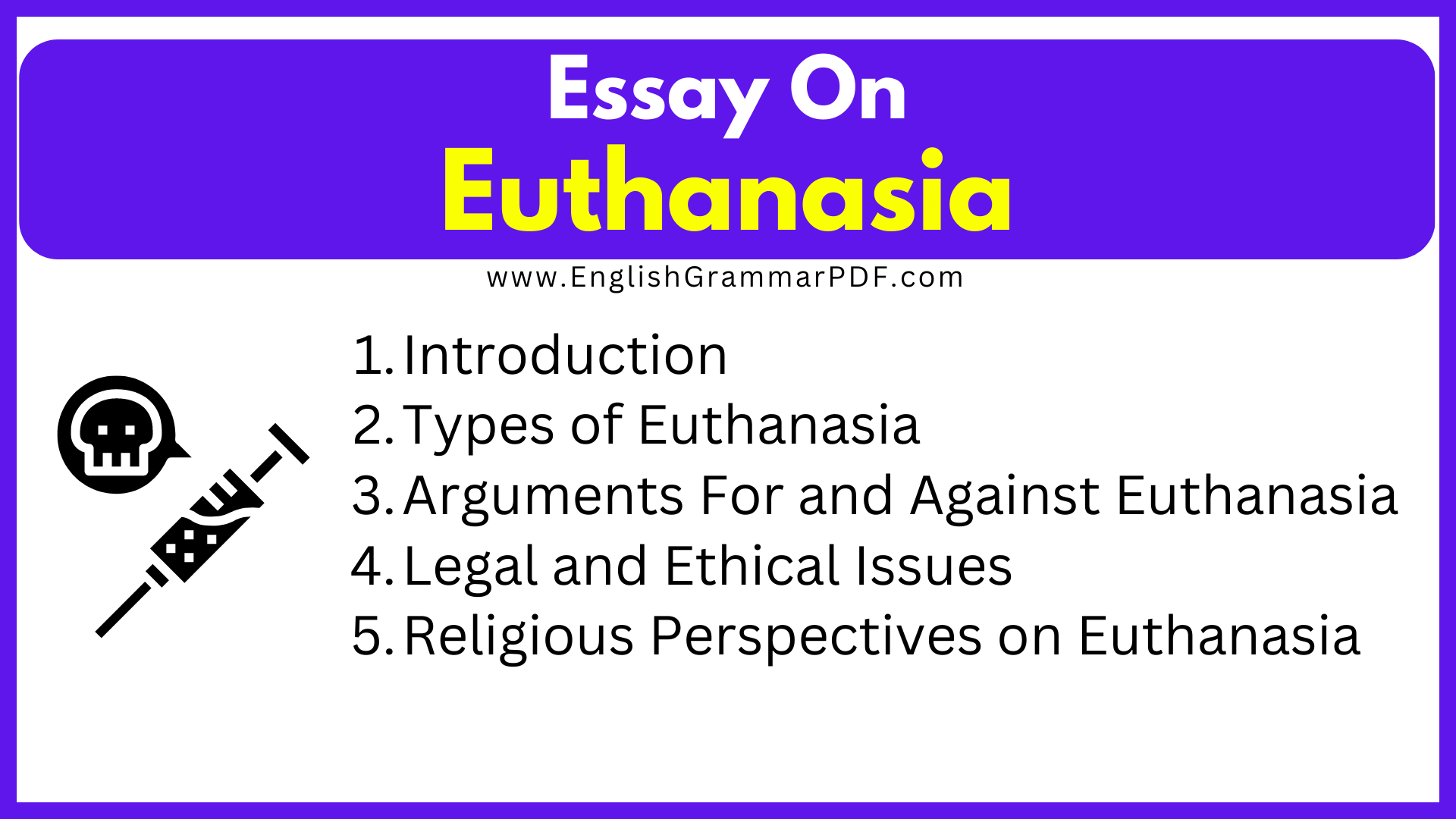
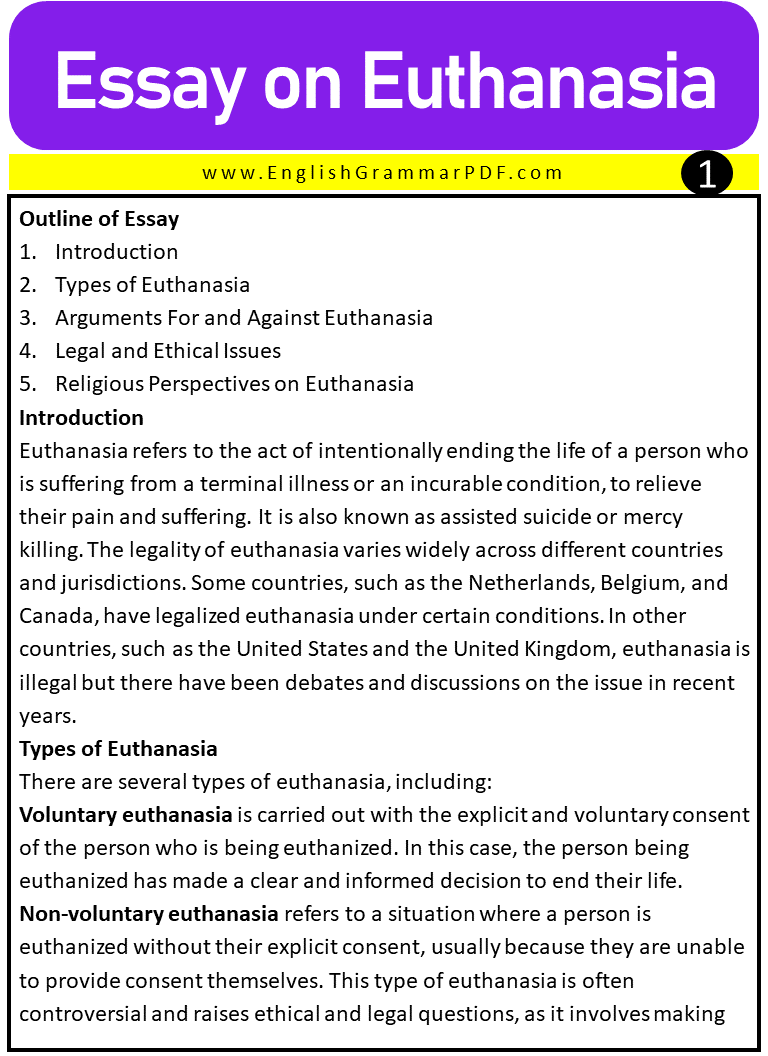
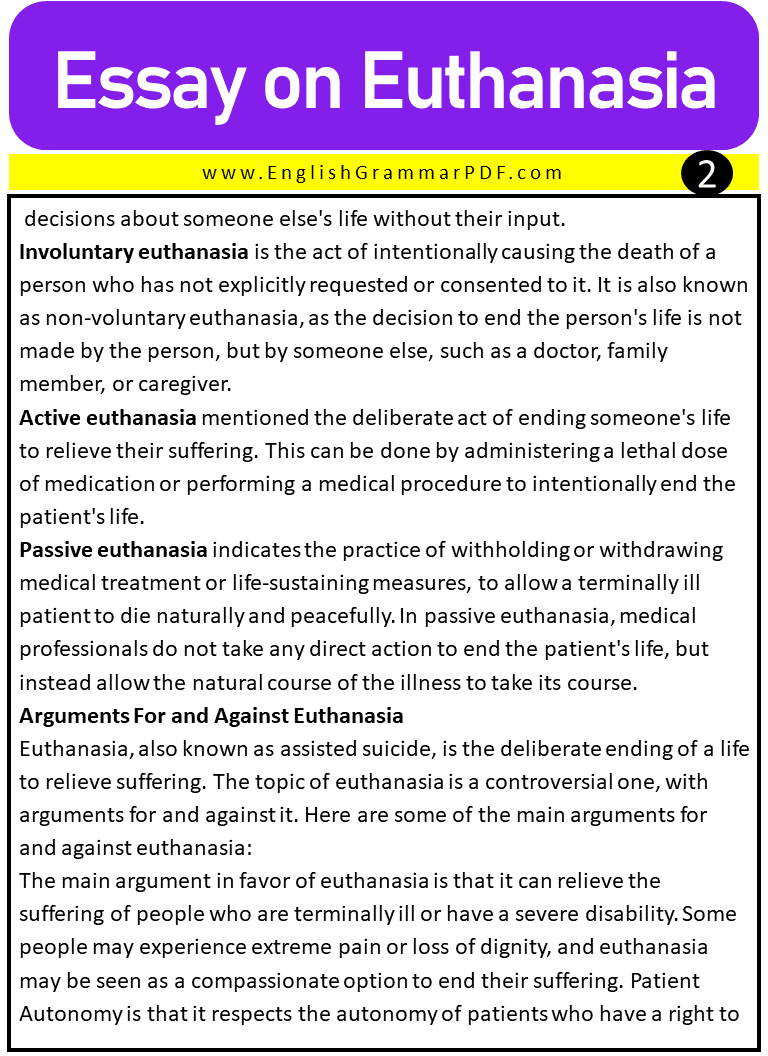
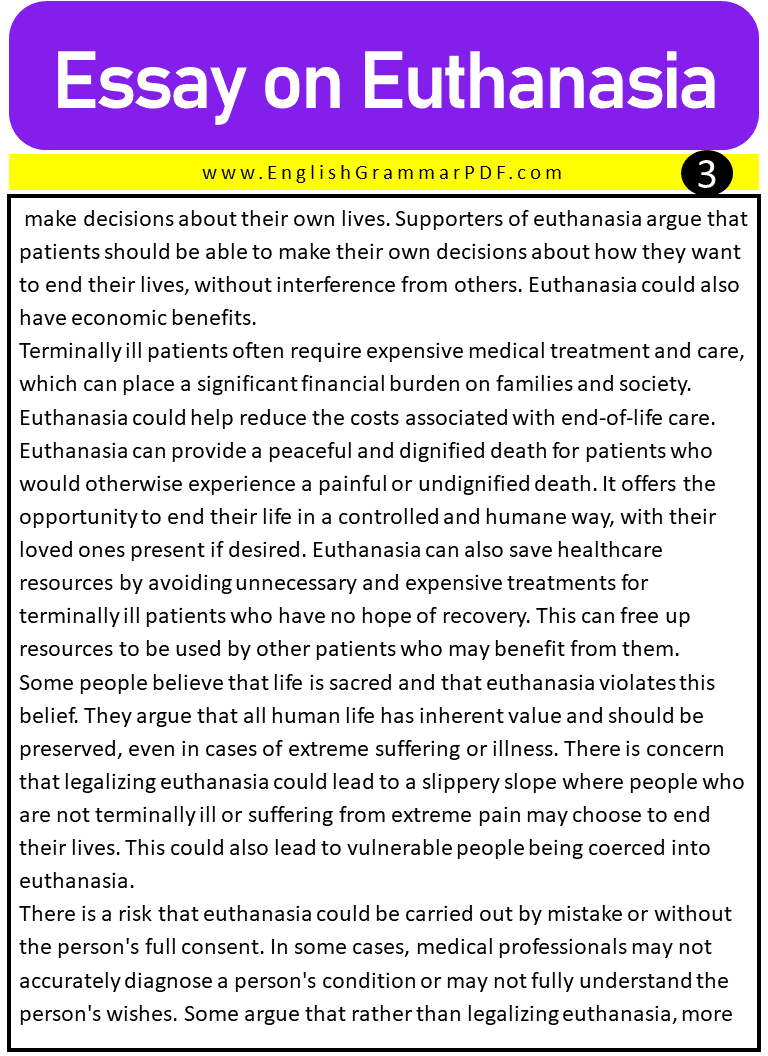
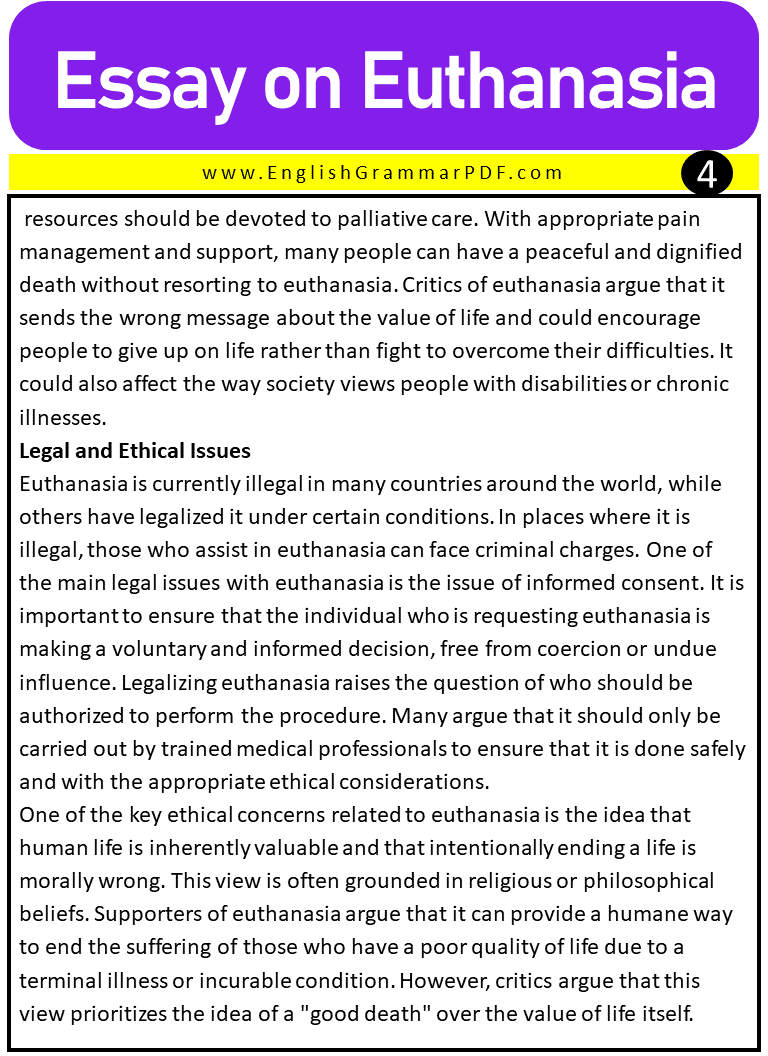
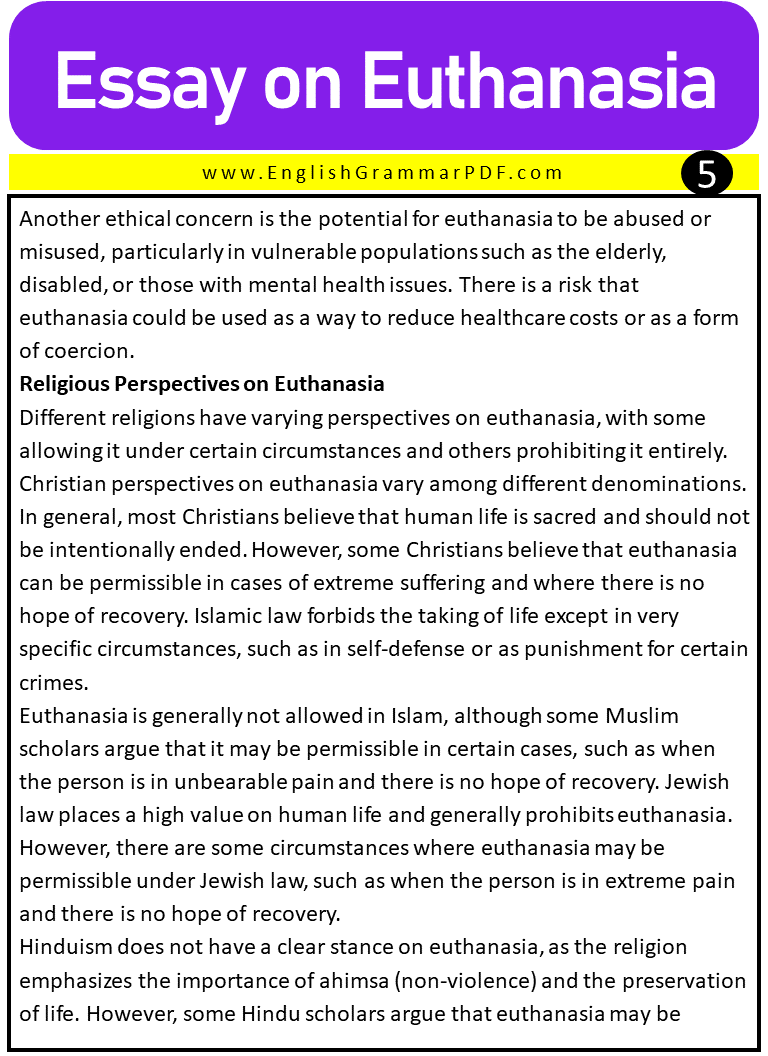
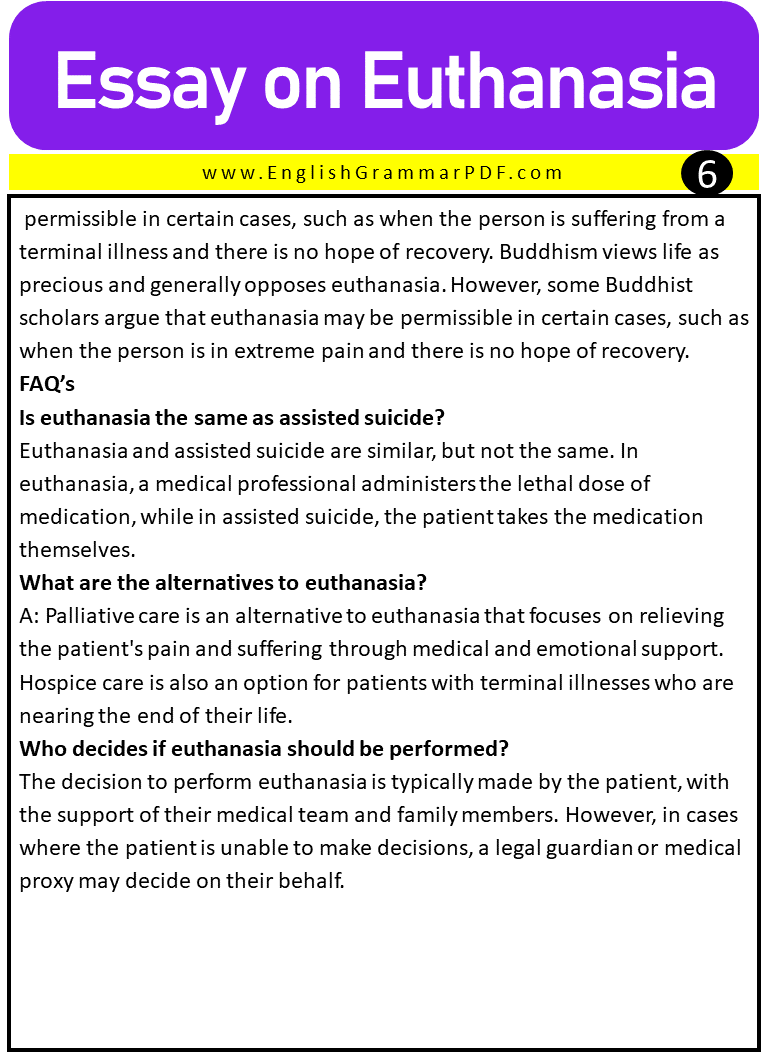
More Essays:


